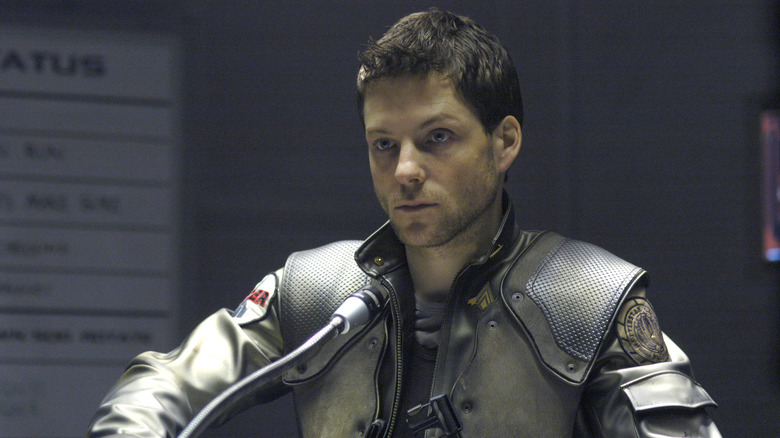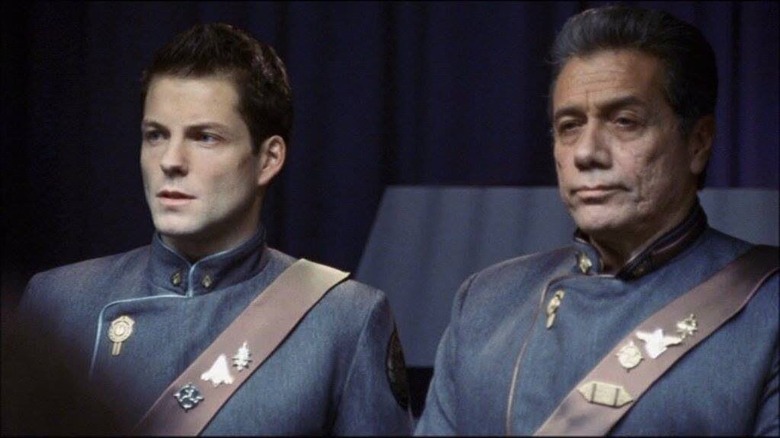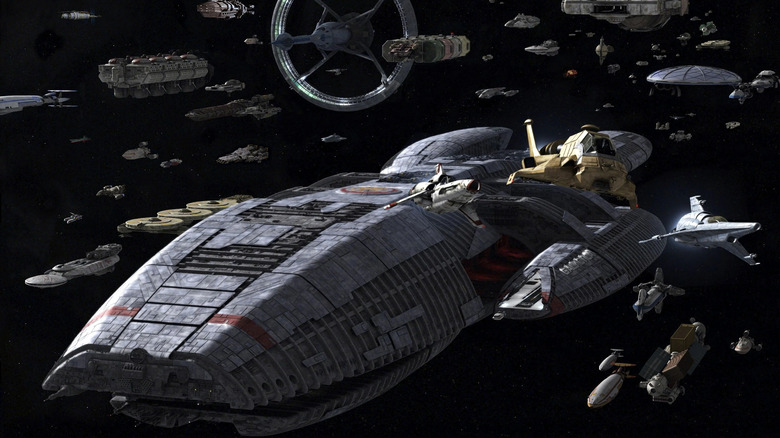Jamie Bamber's Stance On Sci-Fi Nearly Made Him Say No To Battlestar Galactica
A different actor would've played Lee Adama on the reimagined "Battlestar Galactica" had Jamie Bamber listened to his gut. Lee is one of the series' main characters, the son of Commander William Adama (Edward James Olmos) and a reimagined version of the original series hero Apollo (Richard Hatch) — "Apollo" is simply Lee's pilot callsign rather his given name.
Bamber hasn't had the most illustrious career since "Galactica" ended; the fantasy series "17th Precinct," which reunited him with co-stars James Callis and Tricia Helfer and co-creator Ron Moore, never went past the pilot. But that's not a reflection on his acting abilities: Even though it's hard to shine when you share so many scenes with Edward James Olmos and Mary McDonnell (who played Pres. Laura Roslin), Bamber held his own on "Battlesat Galactica." The sturdiness of Bamber's performance reflected his confidence in the show, despite him admittedly not being a science fiction fan.
Juvenile science fiction
In a 2008 interview with The TV Addict, Bamber was asked about his non-existent affection for sci-fi. He said he'd grown out of the genre since he was a kid, feeling it was often "juvenile." The title "Battlestar Galactica" and the show being a remake of a 1970s cult hit also didn't fill him with confidence. However, the pitch of the series convinced him that "BSG" wasn't going to be like the sci-fi shows he'd previously dismissed:
"I think we've changed what people think of as sci-fi. A lot of movies lately, I would say are sci-fi, but in a good way, 'Children of Men,' ... That is sci-fi but it's also really good social and political writing. I think that's what our show does ... Sci-fi has good characters and good stories and intelligent arguments as well as just goofy, not goofy, that's the wrong word, but just shocking the audience with how strange and weird, you know, the planets that we're meeting every week are. That was never something I wanted to be part of."
Bamber wasn't the only actor on the show with reservations about "Star Trek" style goofiness. Edward James Olmos recounted to the A.V. Club how before he took the part of Commander Adama, he made it crystal clear to Moore and co. he wouldn't do the show if aliens were involved:
"I will be very honest with you, on my contract I put down that if I see someone that is ... like some kind of science fiction-type idea of some weirdness out in space, I am going to look at whatever it is that I'm looking at on camera, and I'm going to faint. And I said, 'You're going to have to write, 'Adama died of a heart attack.' You're going to have to write me out. Because I'm out."
Like father, like son.
Getting audiences over the same hurdle
It wasn't just the actors who had trouble with the sci-fi elements of "BSG." In a 2007 interview with Daily Dragon Online (the news outlet of the Dragon Con convention), Bamber was asked about how despite the acclaim, the series was still more of a niche than the concurrent king of TV, "The Sopranos." Bamber responded as such:
"It's frustrating that we do have that stigma attached to us. The fact that we can call it a genre says it all, really; it's not just people, as a drama, as a series; it has to be characters I think that's a problem that science fiction has that it will always marginalize itself by calling itself SF. It's unfortunate that we're on the SCIFI channel; we can't even get away from it. We couldn't brand the show as anything else because of the network we're on. I also think that we're a grown-up show that demands something from the audience. And audiences, by and large, don't want to be demanded anything of."
Bamber's point speaks to how genres are compartmentalized and carry audience expectations. "The Sopranos" is a genre show too that, like "BSG," intelligently uses and deconstructs the framework set by its predecessors; those predecessors just happened to be "The Godfather" and "Goodfellas" instead of "Star Trek" and the original "BSG". The difference is that crime is a genre that carries greater prestige than science-fiction. For stories with the ambition of "Battlestar Galactica," genre can be a prison.


